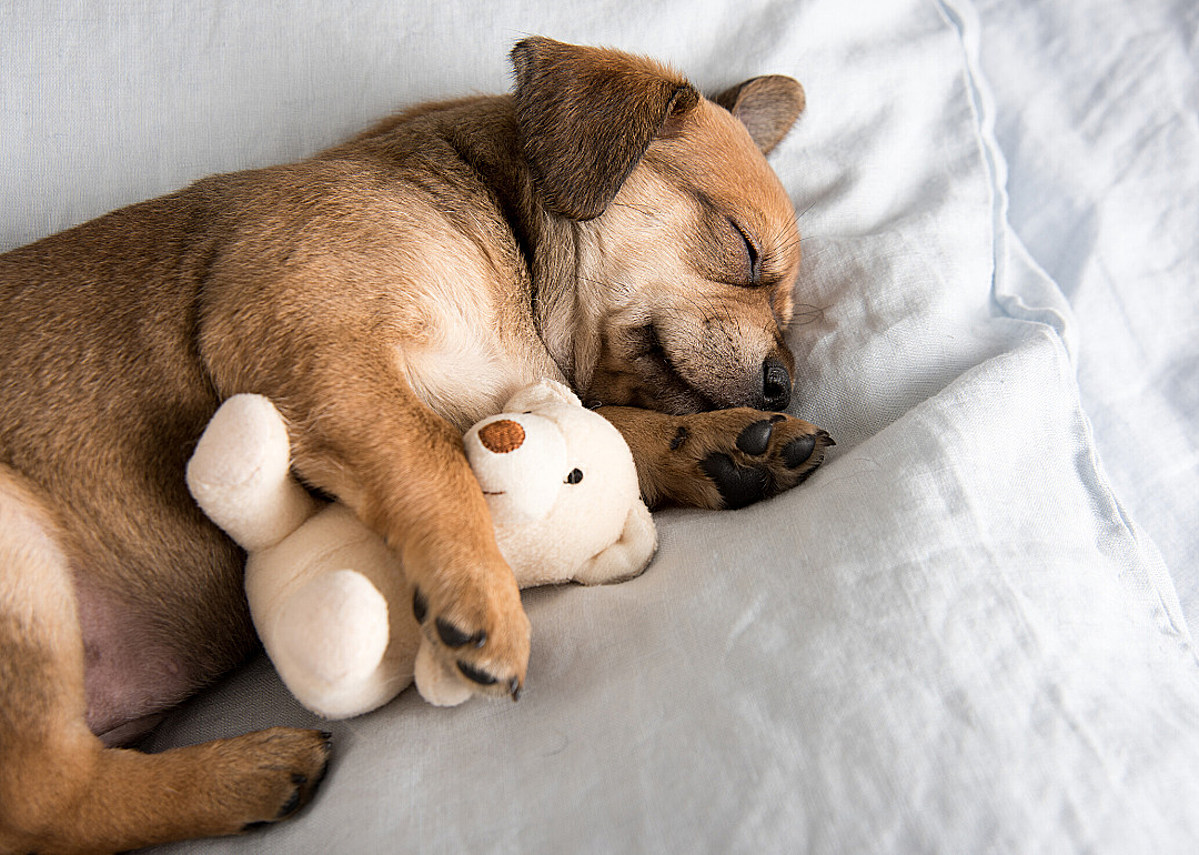
Welcoming a new puppy into your home is an exciting and rewarding experience. However, just like human babies, puppies can experience sleep regression, causing frustration for the puppy and their owners. Understanding the causes of sleep regression and implementing strategies to help your puppy through this phase is crucial for promoting their well-being and ensuring a harmonious relationship in your household. In this comprehensive guide, we’ll explore the phenomenon of puppy sleep regression and provide practical tips for assisting your furry friend in getting the rest they need.
Puppy Sleep Patterns
It is important to comprehend normal puppy sleep habits before going into sleep regression management tactics. Similar to adult dogs, puppies sleep for a large percentage of the day—typically up to 18 or 20 hours in the first few weeks of life. They usually sleep in short bursts, though, interrupted by quick awake intervals for feeding, exploring, and urinating.
Puppies’ sleep habits eventually change to more closely mimic those of adult dogs as they get older, taking shorter naps during the day and longer, uninterrupted stretches of sleep at night. Most puppies can sleep through the night without having to go outdoors for potty breaks by the time they are three to six months old.
What is Sleep Regression in Puppies?
A puppy experiences sleep regression when its sleep patterns abruptly alter, resulting in increased nocturnal awake, restlessness, and trouble falling asleep. Numerous factors, including as stress, sickness, environmental changes, or developmental milestones, might cause this phenomenon. Puppies may go through many bouts of sleep regression during their first year of life, much like human newborns do, as they go through times of rapid growth and development.
Common Causes of Puppy Sleep Regression
Developmental Milestones
Similar to human newborns, puppies grow and achieve several developmental milestones. These developmental milestones, which might interfere with sleep habits, include teething, learning to walk, and cognitive growth.
Environmental Changes
Puppies may experience stress and anxiety due to routine changes, moving to a new house, or the arrival of new family members or pets, which can disrupt their sleep. How to help puppies with sleep regression?
Health Issues
Pain or discomfort from conditions such as gastrointestinal upset, urinary tract infections, or parasites can disrupt a puppy’s sleep. It’s essential to rule out any underlying medical issues if your puppy is experiencing persistent sleep problems.
Separation Anxiety
Pain or discomfort brought on by ailments like parasites, UTIs, or gastrointestinal issues might cause a puppy to have trouble sleeping. It’s essential to rule out any possible medical issues if your dog is experiencing regular difficulty going to sleep.
Sleep Regression
Puppy Sleep Regression at 3 Months (8-12 weeks)
So why would a dog that has been getting excellent sleep throughout the night suddenly begin to wake up?
You can be confident that it is quite normal, even though there are several explanations and that the cause is not always understood. At three months old, your puppy may have a regression in their sleep due to a variety of factors, such as a growth spurt, a fright phase, or acclimating to their new surroundings.
At this time, Crumble refused to sleep in the crate, and because she was potty trained, I started letting her sleep in her basket. Fortunately, she slept through the night and only woke up at approximately 6.15 am, which is a little earlier than her typical 7 am. How to help puppies with sleep regression?
Puppy Sleep Regression at 4, 5 & 6 Months

At this point, teething or a growth spurt are the most likely causes of your puppy’s sleep regression. Your puppy will shed all 28 of its baby teeth and grow 42 adult teeth between the ages of 4 and 6 months, which will undoubtedly cause them great discomfort.
We did see some regression with Crumble at this time; she was around five months old, waking up at two in the morning, wailing, obviously in agony from her teeth, and simply wanting to be snuggled. This wasn’t every day and only lasted for about three weeks. How to help puppies with sleep regression?
Puppy Sleep Regression at 7-18 Months Old
where we are at the moment! For a flare-up, I began taking prednisolone around three weeks ago. In case you’re new to this site, my rheumatologist prescribes prednisolone to me in order to lessen inflammation during flare-ups. But it causes insomnia, which occasionally prevents me from sleeping until two or three in the morning—not ideal when you have a puppy!
Most dogs begin their adolescence at this point, depending on breed and size. Puppy sleep regression from 7–18 months of age may be brought on by an excruciating growth spurt. They can outgrow their kennel or bed due to their rapid development. Your dog may wake up in the middle of the night for no obvious reason when they go through puberty, upsetting their regular sleeping schedule. They also experience a second dread phase, which might interfere with their sleep in the same way as it did when they were three months old.
Nevertheless, Crumble was sleeping well till 8 a.m. before to this. She started getting up at 7 a.m. all of a sudden, then the next day it was 6.50 a.m., then 6.40 a.m., and before long it was 6.30 a.m. Normally, this wouldn’t be an issue that worried me; instead, I would just go to bed early and wait it out with some relaxing music. However, the Prednisolone was making me really anxious; I wasn’t sleeping, I was angry, I had no patience, and I wasn’t myself at all. Although I was aware that the solutions wouldn’t be effective until after the course, I still wanted to conduct some study to be ready.
Strategies to Help Puppies Through Sleep Regression
Establish a Consistent Routine
A regular daily schedule will make your puppy feel safe and at ease, improving their sleep. Maintain consistent feeding schedules, toilet breaks, playtimes, and sleep routines to help your puppy develop a sense of routine.
Provide Ample Exercise and Mental Stimulation
To ensure that your puppy is exhausted before sleep, make sure they have enough mental and physical stimulation during the day. Puzzle feeders, brief training sessions, and interactive toys can help your dog burn off energy and keep their mind occupied.
Create a Comfortable Sleeping Environment
Assign your dog a peaceful sleeping space that is free from disturbances and loud sounds. Give your dog a warm, comfortable bed or box with soft bedding so they may curl up and feel secure.
Offer a Bedtime Snack
Giving your puppy a little, easily digested food before bed will help calm their stomachs and encourage rest. Choose a high-quality, low-calorie treat, such a scoop of plain yogurt or a few pieces of plain cooked chicken.
Practice Positive Sleep Associations
Incorporate relaxing rituals before bedtime, such as a light massage, relaxing music, or a bedtime tale read aloud, to promote pleasant associations with sleep. Your dog may receive this signal from these routines when it’s time to relax and get ready for bed.
Address Anxiety and Stress
Acclimate your puppy gradually to spending time alone in their resting place throughout the day if they show indications of stress or separation anxiety at nighttime. You may assist your puppy become more used to spending the night alone by using crate training techniques and gradually increasing the amount of time spent apart.
Consult with a Veterinarian
Despite your best efforts, if your puppy’s sleep regression continues, speak with your doctor to rule out any underlying medical conditions. In order to help your puppy unwind and sleep better, your veterinarian may also give advice on behavior modification methods or suggest vitamins or drugs.
Conclusion
It might be difficult to deal with sleep regression in your puppy, but you can guide them through it and form lifelong healthy sleep patterns if you are kind, patient, and consistent. You can make sure that you and your puppy have peaceful nights and joyful days together by treating the underlying causes of sleep problems and putting techniques in place to encourage relaxation and comfort.
FAQ
How long does sleep regression typically last in puppies?
Depending on the underlying reason and the particular puppy, sleep regression might last a different length of time. It could endure a few days to a few weeks in certain situations, while it might linger longer in others. Sleep regression can be shortened by consistently putting superior sleep-promoting techniques into practice.
What are some common signs of sleep regression in puppies?
Increased nocturnal alertness, restlessness during sleep, trouble falling asleep, frequent barking or whining at night, and unwillingness to return to sleep after waking up are typical indicators of sleep regression in pups.
How can I create a conducive sleeping environment for my puppy during sleep regression?
During the sleep regression phase, choose a peaceful place to sleep that is free from distractions and loud noises. To encourage relaxation, furnish a warm bed or cage with soft bedding, make sure the temperature in the room is pleasant, and think about utilizing relaxing tools like relaxing music or a nightly ritual.
Can sleep regression in puppies affect their behavior and overall well-being?
The behavior and general well-being of pups can indeed be impacted by sleep regression. Sleep disturbances can make puppies agitated, restless, and less receptive to instruction. Their immune system may weaken and their physical health may be impacted by too little sleep. Promptly addressing sleep regression can aid in averting these adverse consequences and enhance the welfare of your dog.








